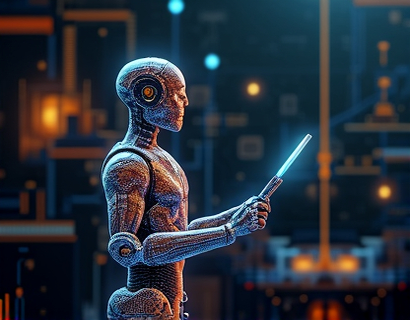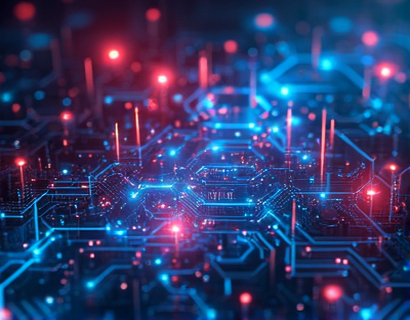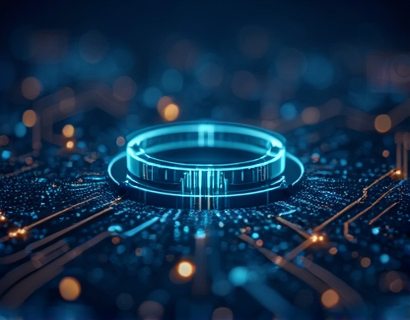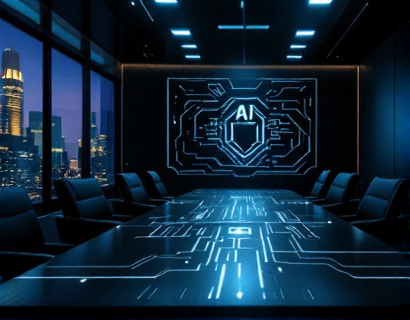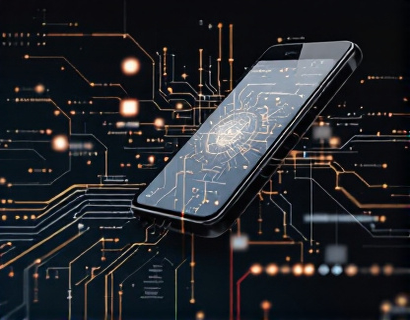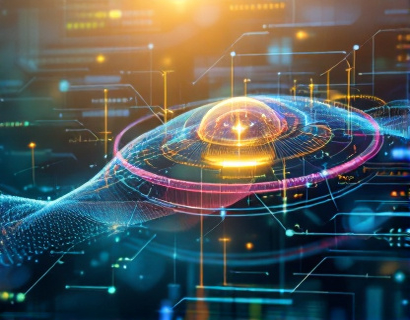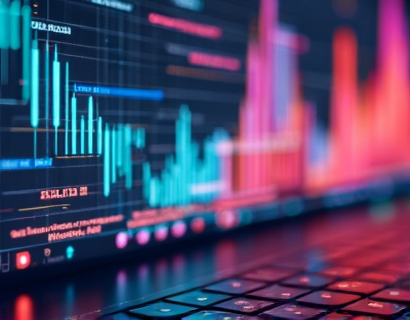Crypto and AI: Pioneering Next-Gen Digital Solutions for Enhanced User Experiences
The intersection of cryptocurrency and artificial intelligence represents a revolutionary frontier in digital technology, promising to redefine how we interact with online services and applications. This convergence of blockchain and advanced algorithms is not just a technological curiosity but a transformative force that is reshaping the digital landscape. As we delve into this topic, it's essential to understand the foundational elements that make this synergy possible and the profound impact it has on user experiences.
The fundamental concept behind cryptocurrency is decentralization, which eliminates the need for intermediaries in transactions. This is achieved through blockchain technology, a distributed ledger that ensures transparency, security, and immutability. On the other hand, artificial intelligence leverages machine learning and neural networks to process vast amounts of data, identify patterns, and make predictions or decisions with minimal human intervention. When these two technologies are combined, the potential for innovation is immense.
One of the primary ways crypto and AI enhance user experiences is through improved security. Blockchain's inherent security features, such as cryptographic hashing and consensus mechanisms, provide a robust framework for protecting user data. AI, with its advanced analytics and anomaly detection capabilities, can further bolster security by identifying and mitigating threats in real-time. This dual-layer approach ensures that user information remains safe and transactions are secure, fostering trust and confidence in digital platforms.
Another significant benefit is the enhancement of user privacy. Traditional online services often rely on centralized databases, making user data vulnerable to breaches and misuse. Blockchain's decentralized nature, combined with AI's data anonymization techniques, can create environments where user privacy is paramount. AI algorithms can process and analyze data without exposing personal identifiers, ensuring that users maintain control over their information while still benefiting from personalized services.
The integration of AI in cryptocurrency also leads to more efficient and user-friendly trading experiences. Smart contracts, self-executing contracts with the terms directly written into code, can automate and enforce agreements without the need for intermediaries. AI can optimize trading strategies by analyzing market trends, predicting price movements, and executing trades at optimal times. This not only reduces the emotional bias in trading decisions but also increases the efficiency and profitability of crypto investments.
Moreover, AI-driven chatbots and virtual assistants can provide 24/7 customer support, answering queries and guiding users through complex processes with ease. These AI-powered tools can understand natural language, learn from user interactions, and adapt to provide more accurate and relevant assistance. This level of personalized support enhances the overall user experience, making digital services more accessible and user-friendly.
The financial inclusion aspect is another area where crypto and AI intersect to create meaningful change. Traditional banking systems often exclude certain populations due to geographical, economic, or regulatory barriers. Blockchain and AI can democratize financial services by providing decentralized banking solutions that are accessible to anyone with an internet connection. AI can help in credit scoring and risk assessment, enabling more people to gain access to loans and other financial products based on their actual capabilities rather than traditional credit histories.
In the realm of identity verification, the combination of crypto and AI can streamline processes and reduce fraud. Blockchain can store identity data securely and transparently, while AI can verify and authenticate identities through biometric data and behavioral analysis. This not only speeds up the verification process but also minimizes the risk of identity theft and fraudulent activities.
The healthcare sector is another domain where the fusion of crypto and AI can lead to significant advancements. Patient data can be securely stored and shared using blockchain, ensuring privacy and integrity. AI can analyze this data to provide insights for diagnosis, treatment planning, and drug discovery. The use of smart contracts can automate insurance claims and reimbursements, making the healthcare system more efficient and cost-effective.
In the world of supply chain management, blockchain provides a transparent and tamper-proof record of transactions, while AI can optimize logistics and predict demand. This combination ensures that products are tracked from origin to destination, reducing delays and enhancing trust among stakeholders. AI can also analyze supply chain data to identify bottlenecks and suggest improvements, leading to more efficient and sustainable operations.
The entertainment industry is not left behind in this technological revolution. Crypto and AI can transform content creation, distribution, and consumption. Blockchain can enable creators to monetize their work directly, bypassing traditional intermediaries. AI can personalize content recommendations, ensuring that users discover content that aligns with their preferences. Virtual and augmented reality experiences can be enhanced through AI-driven environments that respond dynamically to user interactions.
In the realm of Internet of Things (IoT), the integration of crypto and AI can create secure and autonomous systems. Blockchain can ensure the integrity and security of data transmitted between devices, while AI can process and analyze this data to make informed decisions. Smart homes, smart cities, and industrial IoT applications can benefit from this synergy, leading to more efficient, reliable, and secure systems.
The educational sector can also harness the power of crypto and AI to create innovative learning platforms. Blockchain can secure and verify educational credentials, ensuring their authenticity and preventing fraud. AI can personalize learning experiences, adapting to the pace and style of each student. Adaptive learning systems powered by AI can provide real-time feedback and resources, making education more effective and accessible.
As we look to the future, the potential for crypto and AI to drive further innovation is vast. The development of decentralized artificial intelligence (DAI) is an exciting area where AI models are trained and operated on decentralized networks, ensuring that data remains private and control is distributed. This could lead to more democratic and resilient AI systems that are less susceptible to censorship and manipulation.
The challenge, however, lies in addressing the technical and regulatory hurdles that come with this convergence. Scalability, interoperability, and standardization are critical issues that need to be resolved to fully realize the potential of crypto and AI. Collaboration between technologists, policymakers, and industry leaders is essential to create a framework that supports innovation while protecting user rights and ensuring ethical standards.
In conclusion, the merging of cryptocurrency and artificial intelligence is not just a technological trend but a transformative movement that is redefining digital interactions. By enhancing security, privacy, efficiency, and user experiences, this synergy is paving the way for a more connected, innovative, and inclusive digital world. As we continue to explore and develop these technologies, the possibilities for enhancing user experiences are limitless.






